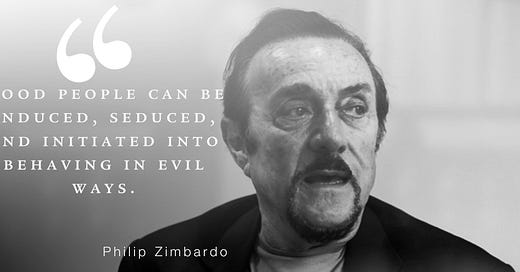
Seeing people as evil
How do we deal with our actions and speech when dealing with things we consider bad, or even evil? A quick exploration.
As I need a few more days to finish my latest part (which might become two parts, even), I think it is helpful to present this article now, as well. It does not directly touch upon the topic, but most definitely is important as it helps form a proper foundation in how we think and act.
A while ago, a friend wrote in a comment on a different forum, Free Atlantis: “for some people it’s quite simple - Trump is evil. Once that premise is accepted, all actions, no matter how unjust or grotesque, are justified. To accept election fraud, or that Russia collusion was a hoax, or that Trump is not a racist means tampering with that core belief. Nothing that challenges their core belief can be entertained, or their entire reality crumbles.”
So how do people come to label any person as 'evil', and then extrapolate as they do? I’d like to start answering this by referring to a very apt quote by the great C.S. Lewis (with his very keen analytical method, drilling down to the very core of a problem [almost Thomistic], influential on my development of thought, next to Tolkien and Chesterton, among others).
“Suppose one reads a story of filthy atrocities in the paper (about your enemy). Then suppose that something turns up suggesting that the story might not be quite true, or not quite so bad as it was made out. Is one's first feeling, 'Thank God, even they aren't quite so bad as that,' Or is it a feeling of disappointment, and even a determination to cling to the first story for the sheer pleasure of thinking your enemies are as bad as possible? If it is the second then it is, I am afraid, the first step in a process which, if followed to the end, will make us into devils.”
-C.S. Lewis, Mere Christianity
This gives a great baseline of normalcy. When confronted with evil, even apart from the question if that evil is real or not, are we able or even willing to be proven wrong on that evil?
As Lewis pointed out: if we aren’t, we are on our way to become evil ourselves.
Now, how do people start on this path? For many, it is fear of being proven wrong or to simply ‘be’ wrong, so they cling to that ‘first story’. If ‘they’ are bad, evil even, ‘we’ must be the good guys, right? Right?! It is usually based on insecurity, and aided by ignorance, which often goes hand in hand, even if not acknowledged or recognized.
Another avenue by which people fall into this trap, is, as mentioned, ignorance. Especially when confronted with a media that is still trusted, but that is telling the most negative angle on the other person/group, is it easy to think the other side is evil. If you hear that Trump put kids in cages, and that is all you read/hear, does it surprise anyone that you start to believe Trump is evil?
Next, another reason is simply a normal human tendency that is taken too far. We all have an innate tendency to divide the world around us in groups: us vs. them. One of the Realistic Group Conflict Theory experiments shows that even the mention of a non-existent group at the other side of the lake started the campers in the experiment to form their own identity, with a name, flags, etc.
Personally, I think that the Realistic Group Conflict Theory is biased, as there are more factors in play than they account for, and because the experiments are hard to execute without ‘steering’ them. Most tellingly, the first experiment by Sherif, in many respects the founder of this theory, yielded the exact opposite result, even when the ‘counselors’ steered events trying to set both groups in that camp up against each other.
What can be seen, even in our own experiences, is that we have a tendency to form groups of us vs. them. Those are not static, and can easily change. Membership is not necessarily fixed, either.
When I first arrived in the US, finding work was not easy. I spoke English with a Belgian accent, had a Belgian college degree that did not have the markers of excellence US employers were looking for, the grading system was very different as well, where in US eyes my grade, even though good, looked bad.
If I would tell the story of my experience, but only change the fact that I am white to black, people would see this as evidence of systemic racism. However, the only thing at play was that of ingroups and outgroups. As a newcomer, I was outgroup. I had not contacts, no inroads, no one to vouch for me or give me a good recommendation. What I had to offer was not recognized, because unfamiliar.
Meanwhile, one can see, for example, African Americans in Ivy League colleges, who are ‘ingroup’, and who will have successful careers after graduating that fellow African Americans from the hood could only dream of. The mistake made by many is to think race is a determining factor, while the main factor is ‘who do I know’? ‘Do my contacts have influence or money, or can they offer well-paying jobs?’, etc.
Now, I am not complaining: this is normal. When Americans would come to Belgium, they would generally encounter the same problems. Not because they are American, or black, or yellow, or whatever, but because they are ‘other’, and cannot immediately be gauged. Only when they learn the basics, and establish a minimum of contacts, will that become easier.
Long story short: we have that tendency to form groups of people familiar to us, meant to help us survive, to make sense of our environment (we cannot know large groups of people, so we divide that in smaller ones we can manage), or to help explore what is around us. It is a primary safety net. This can be expanded by forming a group of groups, and a group of groups of groups, etc.
When that is taken to an extreme, however, this group identification can become the goal, instead of the tool or means it originally was. With group identity as the goal, other groups, the outgroup, necessarily must become a negative, as it detracts from that goal. Everything that threatens to take me out of my group, or that prevents others from becoming member of my group, threatens our goal, and thus the group itself.
A last element is simply mob mentality, group think. This goes beyond ‘ignorance’ in that it is encouraged or fueled by others: creation of bubbles, censorship, etc. to the point that this becomes self-imposed.
The ideological polarization in the media has led to an ideological segregation in the country, as well. People want to avoid fights or debates, or feel more comfortable with people of the same ideology, because of the tensions and distrust sown by the media. If this is accepted without any pushback, it is still, in the end, based on ignorance, but now also through the efforts of overarching groups.
So we have the following basic drivers that brings people to start clinging to that idea that others are ‘evil’:
1) insecurity
2) ignorance
3) a distorted view on ‘ingroup’
4) mob mentality/group think
It is important to note that none of these are ‘evil’ by themselves, nor even ‘wrong’. They just are. They are human conditions as we can all experience at one point or another in our lives. As with many wrongs, the moral element comes into play when we become aware we are doing it. (Granted, this is a very superficial statement, and I could go much deeper into it, but this article is long enough as is). Usually, at this stage, it is possible to still be convinced otherwise.
The next step is simply accept that idea, and promote it: the other person/group IS evil. At that point, no evidence will change one’s mind. Once the other is seen as ‘evil’, all their reasoning and arguments are merely attempts to seduce you, glib talking points, from which you want to protect yourself. Just as you would not want your kids to read Mein Kampf, you forbid them to watch Fox News. Or Breitbart. Or any other channel or book or radio host.
We all agree that letting your children read Nazi propaganda is not a good idea (unless supervised and curated in the context of a history class, for example). So why do we act surprised that others treat for example Conservative sources and persons the same way? The fact is that those conservatives are too often seen as ‘evil’, and that treatment is consistent with how we would treat any other ‘evil’ propaganda.
See how hard it would be to undo that idea that a person is ‘evil’? We would be caught up in that vicious circle of rejection, if we would succumb to labeling people as evil, and not take great pains to insist that IDEAS can be evil, but that PEOPLE have to be respected (and that the label of ‘evil’ should not be treated so cavalier).
As an aside: everyone is susceptible to this, and practices this. I, for example, would try to shield my children from LGBTQ propaganda, where I could (or not allow schools to push certain books, for example). Or sources that are outright communist/Marxist. But I would take great pains to explain my children that my issue is with the ‘ism’, and that they MUST treat every person, even within the LGBTQ or Marxist camp, as people, first and foremost. With respect and dignity.
Each of us has to watch their language, and make sure to always add that safety, and aim their arrows at the ‘ism’, never at people as people. With, of course, the few exceptions, where you might claim “Fauci is evil”, but that would be a very specific claim, and one you’d support by certain facts (He withheld saving treatments while pushing his own toxic drug, and people died, as he would know they would).
In general, there are 2 steps. Luckily, many are still stuck in the first stage, where they have trouble letting go of the idea that someone doing evil things. Those who outright claim that Trump and his supporters, conservatives, etc. are evil, are far fewer. Very loud, yes, but far fewer.
Those, avoid, like you would one who is a narcissist. You cannot possible reach them, anyway. If they are family? Very tough situation, you’ll have to find a way to ‘keep the peace’, usually involving keeping your mouth shut and letting the other say whatever they want. Unfair, but impossible to break through without risking major relational damage. We aren’t equipped to regress such ideas, once fixated.
Those in the middle, keep feeding them evidence of the contrary. The recent spate of blatant censorship has opened the eyes of many, even if they still remain liberal or democrat or generally leftist (which is absolutely fine).
How can you tell the difference? Look at the reaction when you or anyone challenges that idea that Trump or X is ‘evil’. Any hesitation, however short, places them in that middle group. When there is consistent outright and strong rejection, you might have someone thinking those people themselves are actually evil. Good luck.
One last observation: once you understand this mechanism, it is easy to see why such extreme ideas to censor, suppress or even oppress come from: you don’t tolerate evil, period. But you also see how this is a good thing, the drive to protect against evil, but a good that was corrupted and twisted.
This should then help you to not fall into the same trap, and to remain consistent in calling ideas and actions evil, but NEVER people.
And on how one could distort or pervert a good character trait, consider what Lewis (to start, and end, with him) wrote in his book ‘The Four Loves’. He described a family, where the mother, Mrs. Fidget, would love her family so much. Cooked, washed, cleaned, stayed up until they were home, etc. From the outside, an impressive matriarch. But to her family, smothering everyone.
“For Mrs. Fidget, as she so often said, would “work her fingers to the bone” for her family. They couldn’t stop her. Nor could they – being decent people – quite sit still and watch her do it. They had to help. Indeed they were always having to help. That is, they did things for her to help her to do things for them which they didn’t want done…”
This is tragic, when people take a good drive, such as love, or love for a group, to such extremes where it becomes the antithesis: self-serving, and self-congratulating, selfish even. And no one really sees it, except those suffering under it. To the outside, they are very righteous.
Knowledge is power. Let us try to remain calm and in control of ourselves, and resist the urge to call others ‘evil’. Their deeds might be. Their words might be. Their ideology might most certainly be. Granted. But they themselves? I would refrain from making that judgement in the course of our conversations about politics, lest we fall into the same trap, and become like those who seek to demonize whole groups.
Which doesn’t mean evil doesn’t exist, far from it. Nor that are aren’t actually evil people. There most certainly are. But I think this is still a very important habit to keep in mind. Most people are swayed by those evil people or ideas, deceived, but not evil themselves. Even if they participate, under group pressure.
Does that make them accountable? Of course. But not really evil, themselves. That is the very fine nuance I am trying to make, which is very important for any society to remain healthy.











Excellent, I would also add the vantage point of being Catholic in regard to mortal sins and the three elements involved. In order to commit a mortal sin, the three following elements must be simultaneously present:
grave matter, the moral object or content of the action is seriously evil;
full knowledge (or full advertence)- one knows what he or she is doing, and its serious evil content;
and full or deliberate consent – one accepts or tolerates what he or she is doing.
This also contains the admonishment of not succumbing to out inherent passions, but to maintain reason and keeping the lust for the pathway towards evil at bay. And the admonishment to condemn the sin, not the sinner.
A well-written piece explaining a process that needs to be understood. As I read my mind kept saying "yes, but there ARE evil people, what about Fauci", and I was pleased to see this addressed. Unfortunately, those who have completely believed the lies about Trump and conservatives and American history, are willing pawns in a war where they believe "the end justifies the means". Only maintaining the Rule of Law, supported by moral behavior, can this be overcome.